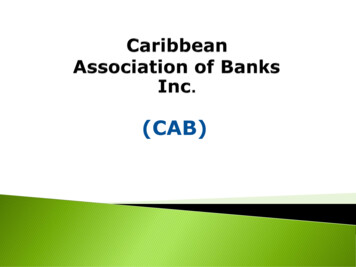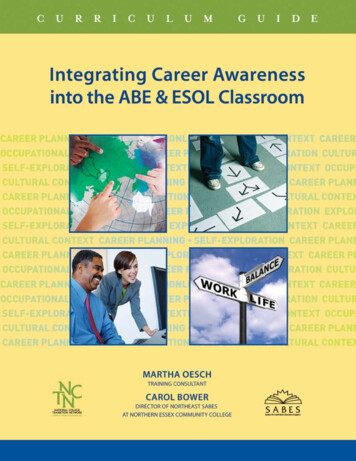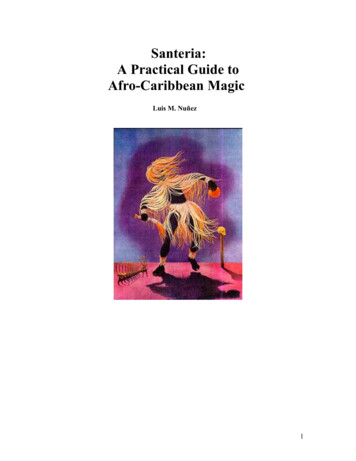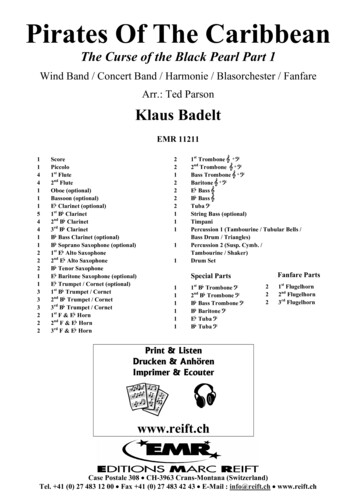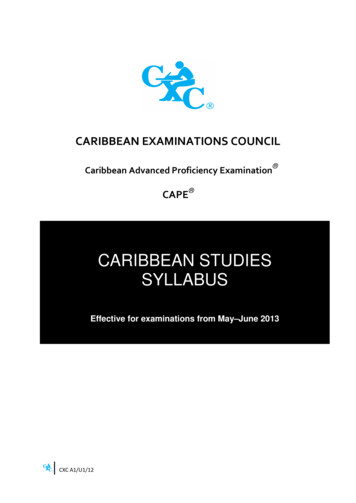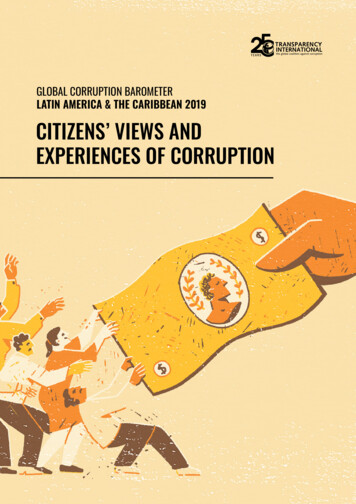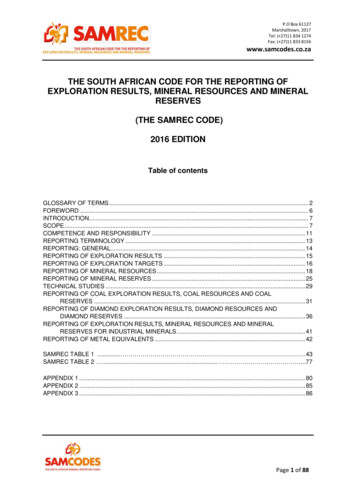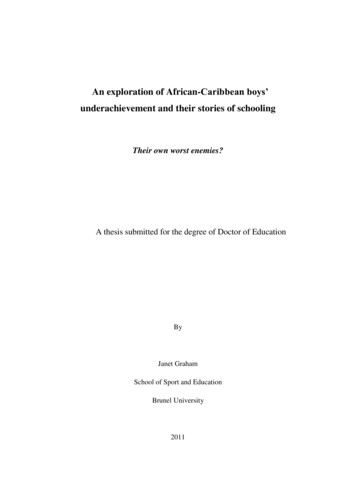
Transcription
An exploration of African-Caribbean boys’underachievement and their stories of schoolingTheir own worst enemies?A thesis submitted for the degree of Doctor of EducationByJanet GrahamSchool of Sport and EducationBrunel University2011
STATEMENT OF NEEDSThe following is a ‘statement of needs’ for the justification and completion of the studywhich identifies:a) the magnitude and significance of the problemAfrican-Caribbean boys continue to fail in secondary education. This is reflected in muchlower than average GCSE results compared to other students and lower rates of participationin school sixth forms and in further and higher education.The problem of African-Caribbean boys’ underachievement is of major concern becausethese boys are not getting qualifications, cannot access higher education and jobs andtherefore will become marginalised and disconnected from society. Government policy hasbeen inadequate in meeting the needs of these boys. Even if standards in education havecontinued to improve African-Caribbean boys have not benefited from this in comparison toother students.b) how a thorough understanding of the problem/needs have been demonstratedI have conducted a thorough review of the literature concerning the underachievement ofAfrican-Caribbean boys. This has included an analysis of the data about the extent of theproblem, the effects of globalisation, national policy initiatives and government interventionon race and diversity in relation to African-Caribbean boys. This has also included a reviewof the trends, patterns and explanations for African-Caribbean boys. In doing so, the reviewhas acknowledged the work of a range of contributors.c) the logical transition from the needs identified, to the empirical study and theproposed solutionsAs a result of reviewing the literature I was able to establish the gaps in the research.Through an Institutional Focus Study (IFS) of a multicultural Inner London School (ILS) italso became evident that African-Caribbean boys were ‘hidden’ and marginalised. Havingidentified the problems and the gaps in the literature review, the next step was to design a setof research questions to be answered. The empirical study was designed as a case study asi
this approach was the most appropriate to capture African-Caribbean boys in their naturalsettings. The methods chosen to collect the data were interviews, questionnaires and asociogram. It was also important to ensure that the data collected was valid and steps weretaken to ensure this. The data was analysed and the findings reported on. As are result a setof recommendations for practitioners, Local Education Authority and policy makers has beenproposed.ii
ABSTRACTThis study investigates why African-Caribbean boys continue to underachieve in schools. Itis based on an extensive study of one Inner London school and has also involved a thoroughreview of the existing literature about why this particular group of students do not fulfil theirpotential.The inspiration for this study has been the work of Bernard Coard (1971) who wroteinfluentially about how the first generation of West Indian children was branded as‘Educationally Subnormal’ by the British school system. Over thirty years later, the failureof African-Caribbean boys continues to be an alarming phenomenon, despite years of multiculturalism and education for ‘diversity’. One of the arguments of my study is that AfricanCaribbean boys can even become ‘hidden’ amongst much larger groups of students who haveEnglish as an Additional Language (EAL) and who as a result, often receive extensiveadditional support.British schools have changed since the time that Coard (1971) was writing, but as my studydemonstrates African-Caribbean boys are still likely to be over represented in the variousBehaviour or Learning Support Units.I have also discovered that, far fewer African-Caribbean boys in the school investigated are likely to go on to the sixth form in comparisonto students from other backgrounds.Even though there have been many studies about race and education, far fewer researchershave tried to ‘hear it from the boys’. I have carried out extensive research at school levelamongst the boys and their teachers. As well as conducting an Institutional Focus Study ofthe school in question. I have argued that, whilst other groups such as white working classboys have been hostile to school, on the contrary, most of the boys in my study wanted tolearn or saw the importance of obtaining qualifications in order to improve their chances inlife.iii
African-Caribbean boys are not ‘their own worst enemies’, but the reasons for theirunderachievement are complex, being the result of a range of factors. As I am a practitioner,I have concluded my study with some practical proposals for change which I hope will makea difference to the lives of these boys.iv
TABLE OF CONTENTSPage NoTITLE PAGECoverSTATEMENT OF NEEDSiABSTRACTiii-ivGLOSSARY OF CHARTS AND TABLESix-xACKNOWLEDGEMENTSxiCHAPTER ONE: INTRODUCTIONThe focus and significance of the study. Why this is work is important to me.1How this adds to existing research. Biography of the author.4The politics of education. The National Curriculum and league tables6The use and definition of culture9The research questions adopted, the research approach and what is containedin the thesis10Graphical display of the conceptual framework adopted in the thesis13Outline of the literature review and summary15CHAPTER TWO: LITERATURE REVIEWIntroduction. Purpose of the review. Terminology for defining underachievement.Effects of globalisation, national policy initiatives and government intervention onrace and diversity and African-Caribbean boysv18
African-Caribbean children in British schools - the historical journey of the23African-Caribbean childProblems experienced by the new African-Caribbean community in Britain26Globalisation, population movements and their impact on African-Caribbean boysRace, education and politics32The national curriculum and students’ achievement41From New Labour to Conservative and Liberal Democratic Coalition44African-Caribbean boys’ underachievement in comparison to other boys46The extent of African-Caribbean boys’ underachievement47Trends, patterns and explanations for African-Caribbean boys’ underachievement49Differences between African-Caribbean boys and girls52Social class background55Exclusion from school64Youth culture and urban youth culture and the influence on African-Caribbean boys’66subculture, Technology and youth cultureSubcultures and African-Caribbean boys’ subculture67Masculinity69The significance of role models to African-Caribbean boys77The implication of the literature review for future research81The gaps in the literature about African-Caribbean boys, the next step of this study,83emerging themes from the literature review, research questions and empirical studySummary88vi
CHAPTER THREE: INSTITUTIONAL FOCUS STUDYIntroduction. The school. The ILS student population. Ethnic composition89of teachers employed in the school. Some general features of the school.The school’s mission statement and developmental plan.94The social and economic influences on the school, crime statistics in the borough95The make-up of the population in the borough in which the school is located96The school sixth form97Constraints faced by the school. Position of the school in league tables98Gender differences in achievement in the school. The gifted and talented cohort102Special educational needs.104Students with EAL and their achievements107African-Caribbean boys in the ILS108The learning support unit and underachievement111Students who have learning difficulties112The School’s policy of inclusive learning, PSHE and citizenship117Mentoring as a strategy to raise achievement of students118Mentoring of African-Caribbean boys119Extra curricular-activities120Enrichment days121Parental involvement, community and industry links121Ofsted and the school’s development plan123Summary124vii
CHAPTER FOUR: METHODOLOGYIntroduction and purpose of the study125Methodology, paradigms and philosophical issues126The research question131Research approach and research design132Research design and research methodology adopted for this study and - case study134Benefits and limitations of being a teacher researcher142Piloting the study151Research context152Participants in the study – students153The rationale for selecting teachers155Designing the questionnaire157Designing the semi-structured interviews158Methods of data collection – semi structured interviews and sociogram159Analysing data163Using a sociogram164Designing the headteacher’s interview164Student questionnaires164Analysing questionnaires165Analysis of semi-structured interview167Analysing of sociogram167Validity, reliability and triangulation167Ethical issues173viii
Summary175CHAPTER FIVE: DATA ANALYSIS AND FINDINGSIntroduction177Responses to the research questions – students178Teachers responses to the research questions220The findings from the interview with the headteacher233An evaluation of the general approach adopted to answer the research question235Overall findings240Summary240CHAPTER SIX: DISCUSSIONS, IMPLICATIONS, RECOMMENDATIONSAn evaluation of my research and addressing validity242The significance of this study249Recommendations for programmes of teacher training251Recommendations for selective recruitment of teachers253Recommendations on identifying the ‘hidden needs’ of African-Caribbean boys253Recommendations for curriculum which enhances diversity and meets the needs255of African-Caribbean boysRecommendations for inspirational and excellent teaching that meet the needs of255African-Caribbean boysRecommendation for a modern approach to school to environment and to255teachingRecommendation for that an alternative is provided to the LSU256Recommendations for a celebration of all cultures in school256ix
Recommendations for separating black boys256Recommendations on mentoring black boys257Recommendations for a strategy to involve black parents258Recommendations for a strategy to involve the black community259Recommendation for a PSHE policy which helps boys to understand issues affecting259them in school and in societyContribution the study has made to the research on African-Caribbean boys’260UnderachievementHow the work with teachers has contributed to this study264Strategies for presenting a training package to the Local Education Authority and266recommendations to the headteacher of the ILSTraining package for teachers266Training package for African-Caribbean boys266A programme of strategies which the headteacher can adopt to address the267‘hidden’ population of African-Caribbean boysEnd thoughts267REFERENCES271GLOSSARY OF ABBREVIATIONS293APPENDICES295x
ACKNOWLEDGEMENTSI would like to extend my sincere thanks and gratitude to:My supervisors Professor Mike Watts and Doctor Jacqueline Hebron for their patience,understanding, support, guidance and toleranceProfessor Valerie Hey for helping me to gain a wider perspective of research and helping meto understand that there are many perspectives and approaches adopted by researchers.Thanks for helping me to think outside the box, get mad and think again.My friend, Dr Martin Allen, for his advice, support and guidance and helping me to carry onwhen things became difficult and I felt like giving up.To Bernard Coard for agreeing to meet and discuss his work with me in 2004 and 2006 whichhas formed the foundation of my journey into studying African-Caribbean boys, and foroffering further advice on my thesis in 2008 and 2009.My family for the period of time when I was isolated and distant from them.Pamela, my cousin for making it possible to meet Bernard Coard in 2006 and 2008.To Jason, Shane and Belinda for being so open and frank about their attitudes to educationwhich has contributed vastly to this study.My colleagues at the Inner London School for putting up with me during my stressfulperiods.I have concluded my study with some practical proposals for change which I hope will makea difference to the lives of these boys.xi
GLOSSARY OF CHARTS AND TABLESPageFigure 1Ethnic composition students at Inner London School88Figure 2Ethnic composition of teachers at Inner London School89Figure 3Borough league table percentage GCSE Grades A* to C97Figure 4Borough schools Point Score for A-Levels 2004-200798Figure 5ILS Gifted and Talented students by ethnic origin102Figure 6Ethnic breakdown of students with special needs104Figure 7Percentage of students with English other than first language106Figure 8Number of Students in the Learning Support Unit by ethnicity112Figure 9Learning outcomes of students in the Learning Support Unit113Figure 10Percentage of students by ethnicity permanently excluded114Figure 11The qualitative paradigm127-129Figure 12Sample for questionnaires and interviews152-153Figure 13Students responses to questions about learning175-178Figures 14-17 Analysis of questions 1 and 2176-177How African-Caribbean boys see learningFigures 18-21 Analysis of question three – It’s cool to learn180Figure 22183Students responses to the questions about friends and peer groupFigures 23-26 Analysis of question five - It is cool to be part186-187of a groupFigure 27Students responses to the questionnaires190Figure 28-31Analysis of question seven– Mentors supporting191students in school is a good thingFigures 32-35 Analysis of question nine –Teachers understand mexii192-193
Figures 36-39 Analysis of question eleven –School could do more to196make learning more interesting.Figure 40How do teachers perceive African-Caribbean boys’ attitudes217-218towards learning, sub-cultures and socialisation in school?Figure 41African-Caribbean boys’ sub-cultures adversely affect their learning.218Figure 42Question four – African-Caribbean boys need support group220outside of school to help motivate them to learn.Figure 43What do teachers thing about parental involvement in their221children’s education?Figure 44What do teachers think about the policy implications to changing222-223African- Caribbean boys’ attitude to learning and achieving?Figure 45Question number three – Excluding African-Caribbean boys223from school is not the most effective way to deal with this problem.Figure 46Question six– The National Curriculum caters adequately224for diversity and ethnic minorities in secondary education.Figure 47Question number seven – School provides quality education to226meet the needs of ethnic minority childrenFigure 48Question number nine – Sufficient emphasis placed on extra228curricular activitiesFigure 49Analysis of responses to question ten – the current political229party policies on education enhances diversity.Figure 50The approach adopted to answer the research questionxiii232-233
xiv
CHAPTER ONEINTRODUCTIONThis chapter serves as an introduction to a study of African-Caribbean boys and theirteachers in an Inner London School (ILS). It sets out the aims of the study as well asthe motivation for conducting it. The study also links my biography to the widerquestions of the underachievement of African-Caribbean boys in the British schoolsystem (a system that is now dominated by a National Curriculum and league tablesand which is discussed further as part of the literature review in subheading 2.9 and inthis chapter in 1.5). The Oxford Dictionary defines underachievement as ―doing lesswell than expected, especially in schoolwork.‖ A more comprehensive definition ofthe term is provided in Chapter Two, 2.3.Before setting out the research question and outlining the research approach thischapter also introduces some of the themes that are integral to the thesis; for examplethe significance of African-Caribbean boys‘ subculture and a definition of this culture.1.1 The Focus of the StudyThis study is about the underachievement of African-Caribbean boys in the Britishschool system. It centres on a case study of African-Caribbean boys and their teachersin an Inner London School. This is supported by an Institutional Focus Study (IFS)which provides a context of the school and its student population as well as the area itserves. Before conducting these however, it was necessary to review the literature onAfrican-Caribbean boys‘ underachievement.This involved a period of extensivereading, the results of which are reported critically in Chapter Two. The literaturereview has been conceptualised into three sections, (see 2.1). Section i) the effects ofglobalisation, national policy initiatives and government intervention on race anddiversity and African-Caribbean boys, section ii) data on African-Caribbean boysunderachievement in comparison to other boys and section iii) trends, patterns andexplanations for African-Caribbean boys‘ underachievement. A summary of the1
conceptual framework adopted for this study is also included at the end of this chapterin 1.10.As well as looking at the underachievement of African-Caribbean boys from differentperspectives, I have been particularly influenced by the work of Bernard Coard, whowrote about the plight of the West Indian child in British schools in the 1960s andearly 1970s (Coard, 1971). I have discussed Coard (1971) in Chapter Two undersection i), 2.4. I interviewed Mr. Coard in Grenada in, 2004, 2006, 2008 and again in2009 and these interviews are discussed in Chapter Four and Six. I have also beeninfluenced by other more recent studies about the underachievement of AfricanCaribbean boys, for example the work of Gus John (John, 2006) and discussed insection i) of the literature review. I have also examined the work of Tony Sewell(Sewell, 1997, 2002, 2005, 2007 and 2009). This is discussed in section iii) 2.20.In accordance with Brunel University Education Doctoral requirements, the literaturereview is followed by an Institutional Focused Study (IFS) of an Inner LondonSecondary School (which will be referred to as ILS throughout the thesis). This is aschool where I am also a teacher. The school has a diverse population and is locatedin one of London‘s most racially mixed boroughs (see Chapter Three, 3.3 and 3.7).The IFS has involved an examination of the school‘s statistical data, policy handbook,discussions with staff from various departments and an outline of the history of theborough in which the school is located and also a comparison with the performance ofother schools in the borough.Following the IFS, a case study was carried out using questionnaires and interviews toinform and develop the study of African-Caribbean boys (Chapters Four and Five).The aim was to find out how a group of African-Caribbean boys perceived school,teaching, learning and their experiences of peer group pressures. Data has beencollected from the teachers of these boys using questionnaires, because it wasimperative to hear from them as well, so as to understand their perceptions of the boysin school, gained through day-to-day contact with them. An interview with theheadteacher of the school was also conducted in order to capture her perceptions ofAfrican-Caribbean boys and the constraints she faced as the leader of the school.2
1.2 The significance of this studyThis research is an essential contribution to work already undertaken by others. Theliterature review (Chapter Two) examines the existing research as to why AfricanCaribbean boys underachieve. It is almost 40 years since the time of Coard‘s (1971)work discussed in Chapter Two under section i). There have been many policychanges and society (particularly in areas such as London) has become much moresocially diverse. However, according to Phillips (2005) African-Caribbean boys arestill underachieving at such an alarming rate that they are predicted to become a newunderclass in a new global society (also discussed in Chapter Two, sections i), 2.6 andin Chapter Six, 6.3). This is because they will not have the qualifications required forthe type of employment that will take them into a reliable income bracket.It is also the case that schools have changed considerably since the time of Coard(1971). Some, like ILS, where the main research is conducted have become multicultural. Much work has been done by organisations such as ‗From Boys to Men‘(2005) ‗Generating Genius‘ (Sewell, 2005) and the ‗Black Boys Can Association‘(2007). In my view, this is valuable work as it supports the achievement of blackboys in helping them to realise that they can achieve and do well academically.However, these are isolated and relatively small projects which do not cater for theneeds of all African-Caribbean boys who as a group continue to underachieve.In conducting the study it was necessary to give a sample of boys the opportunity tohave a voice about how they saw their world in school. I believe that it is essential tohear the boys‘ view point so that, having listened to them and found out what theywant for themselves and from their school we can gain an understanding of theirsubculture and begin to create new policies to address their underachievement atschool level.I strongly believe that African-Caribbean boys should be given special considerationwithin mainstream schooling. This does not mean giving them preferential treatmentbut should be viewed as an attempt to address the issue of their currentunderachievement that has such profound implications for the future of these boys.Listening to the boys‘ voices is essential in order to develop strategies which can help3
to generate a future for them which promises success, good jobs, allows them tobecome balanced individuals, with enriched lives - so they do not see the streets as aplace to go where they may become involved in crime, be seriously hurt or evenkilled.During the course of this study I have become passionate about this area, wanting todevelop knowledge and expertise about the issues that have arisen. I feel very stronglythat new strategies are needed to develop the education of African-Caribbean boysand to help them to learn, to remain in school beyond compulsory school age, to takeA-level qualifications and go on to university. I am committed to trying to make adifference in this area.1.3 How this work adds to existing researchThe research findings summarised in Chapter Five and Six, make an importantcontribution to existing work. As a result of the case study and IFS, even though it isclear that African-Caribbean boys are still underachieving, the nature of thisunderachievement has changed. When Coard (1971) wrote his book West Indianchildren were a visible minority in predominantly white schools.The African-Caribbean boys in this study are, I argue, a ‗hidden‘ minority in a diverse/multicultural school with very few white children and where African-Caribbean boys aregrouped with children with Special Educational Needs (SEN), English as anAdditional Language (EAL) and African Black children This becomes clear to thereader in the IFS, (Chapter Three) particularly the section about the Learning SupportUnit (LSU), where the boys are over represented in comparison to other groups, but itis also apparent in the responses of teachers to the question of African-Caribbeanunderachievement, described in Chapter Five,5.5 and also in the discussion in ChapterThree, 3.21 to 3.25.1.4 Biography of the author (and key issues being addressed)My journey into boys‘ underachievement in schools really commenced when, afterover twenty years of working in the business world, I became a teacher of BusinessStudies, something that I had always wanted to do. I joined a Graduate Teacher4
Programme and began teaching in an inner London school. This teaching role gaveme an immediate insight into the issue of underachievement of boys and studentsfrom ethnic minority backgrounds, particularly in relation to examination results. Inparticular, my interest was in the GCSE results of African-Caribbean boys and alsothe attainment differences by gender, race and social class background. It is importantto make these comparisons to establish general trends and reasons for AfricanCaribbean boys‘ underachievement. My studies to date have helped to develop a keeninterest in knowing why these groups of children underachieve in education and alsoin their motivation to learn. As a new teacher, it was essential for me to gain a betterunderstanding of these issues and, therefore, I pursued an MA in Education. Thesubject of my dissertation was student underachievement and how to developstrategies to motivate boys to improve their educational achievement. The MAcontributed to developing my interest in the relationship between gender andachievement and in aspects of black and white working class boys‘ performance inschool. As a result of this current study, I now have greater understanding of theissues of student underachievement and the many complex factors that contribute tothis.The work is important because it addresses an issue close to my heart as an AfricanCaribbean woman from Grenada, who arrived in Britain when my parents came hereas part of the early migration from the West Indies in the mid 1960s. Most of myeducation has been in Britain. My son, nephews and other male members of myfamily have also been educated in Britain. I do not consider that they have reachedtheir full educational potential because they have not gained the qualificationsnecessary to embark on good careers. For example they do not have universitydegrees. As a teacher, I have seen the impact of underachievement on AfricanCaribbean boys.This group of boys often leaves school without academicqualifications because they have underperformed at GCSE and cannot continue withAdvanced level studies, or go to university. Therefore they have to take up furthereducation, low paid jobs in the service industry, unemployment or inhabit streetculture, with some becoming involved with crime.5
As a teacher of vocational education, my work brings me into contact with studentswho have underachieved in their GCSE examinations and who enrol onintermediate/level two business courses for one year before they can advance to Alevel or equivalent courses. From my work with students who have English as anAdditional Language (EAL) or have Special Educational Needs (SEN), I canappreciate some of the difficulties they face in accessing the curriculum.It isimportant to mention this because in Chapter Three, 3.20 there is a discussion abouthow African-Caribbean boys are ‗hidden‘ among these groups.1.5 The politics of education, the National Curriculum and league tablesThe National Curriculum was introduced as a new ‗entitlement‘ to school children asa result of the Education Reform Act of 1988. However I share the position adoptedby my fellow countryman, Professor Gus John (2006) that despite decades of reform,even though it provides an ‗entitlement‘ - the National Curriculum does not cater fordiversity. John (2006) argues, for example, that the White Paper, Higher Standards,Better Schools for All (DfES, 2005) is ‗white‘ in every sense of the word and that it issilent on the issue of schools‘ and governing bodies‘ legal obligations in compliancewith anti-discrimination and human rights legislations. He is also of the view thatnothing is said about the role of schooling and education in combating racism andpreparing all children for living peaceably in, and managing, a multi-racial society(see Chapter Two, section i) where this issue is discussed further).John (2006) says that despite the fact that the government has established variousworking groups overseeing the recommendations of the Stephen Lawrence Inquiry(Macpherson, 1999) and the fact that schools and local education authorities are nowrequired to have in place a race equality policy/scheme and an action plan spelling outhow their policy is to be implemented, nothing has seriously changed. He also assertsthat this policy has not catered for the diversity of the school population in Britain.John (2006) challenges the second section in the White Paper on black and minorityethnic (BME) children, by saying that ―whilst many black and minority ethnic youngpeople achieve well, a significant number fail to realise their potential‖ (John, 2006p.2). He argues that young African-Caribbean children and those from Pakistani and6
Bangladeshi backgrounds are among the lowest achieving pupils in our schools (seeChapter Two, section ii), 2.12).In line with the arguments of Coard (1971), John (2006) argues that ―the brain matter,the genetic material of people like us underwent some sort of inexplicablemetamorphosis when we crossed the Atlantic, such that the predominant experiencewe have had in the British schooling system is of underachievement and failure‖ (p,198). He argues that this is ―so much so that we are expected to believe that it isbeyond the capacity of the schooling system to give us quality education‖ (p, 198).He contends that we now have the disturbing situation in which the academicallysuccessful, high achieving, working class, inner-city British born black male ofAfrican-Caribbean background is an increasingly rare species. John (2006) concludesthat black males are much more to be found among the worrying statistics that gaverise to this particular study and are confirmed by it. (This is discussed further inChapter Two, section i), 2.5).John recalls how Coard (1971) alerted the education establishment to the scandalousphenomenon of ‗How the West Indian Child is Made Educationally Subnormal in theBritish School System‘. (West Indian children were wrongly labelled as‗Educationally Subnormal‘ and taken out of mainstream schools and placed in specialschools). John (2006) is also of the view that ‗Outcast England now, no less than thatbook then (Coard, 1971) is a major indictment of the British schooling system‘ and heasserts that then, as now, black parents have felt the need to take drastic measures tosafeguard their children‘s e
I have conducted a thorough review of the literature concerning the underachievement of African-Caribbean boys. This has included an analysis of the data about the extent of the problem, the effects of globalisation, national policy initiatives and government intervention on
